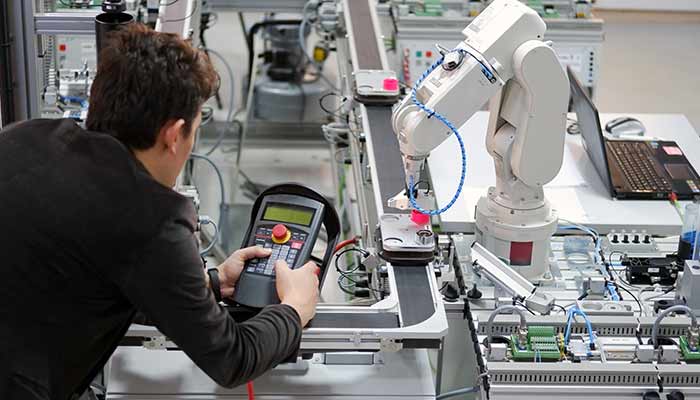News and Events
The robotics industry is constantly changing and evolving. New robotics technologies and developments in automation are quickly creating exciting career opportunities at every education level – from micro-credentials to PhDs. Here is where you can learn more about robotics careers in manufacturing and how these new technologies are benefiting workers


NEWS
The 5 Major Applications of Robotics
By John Zappa | March 27, 2023 If you're somebody who's interested in robotics, then you may already know about these 5 major applications.
If you're somebody who's interested in robotics, then you may already know about these 5 major applications.
1. Pick and Place – This field involves robots manipulating objects, such as carrying and placing items.
2. Vision – Robots use sensors and imaging techniques to recognize objects in their environment.
3. Autonomy – This field involves the development of intelligent navigation systems for robots to move around autonomously.
4. AI – This field covers how robots can make decisions on their own, as well as how they learn and adapt to changing conditions.
5. Human-Robot Interaction – This involves designing interfaces that allow humans and robots to interact in a meaningful way.
These 5 fields of robotics are all connected, with each field relying on and influencing the others. For example, a robot’s mobility will depend on its ability to perceive and manipulate objects in its environment. So, as technology advances in each of these fields, robots become more effective overall.
While you don't have to choose one of these fields to study for a robotics education, there are those who specialize and go on to spend their careers focused on one of these areas. It all depends on your individual interests and skills, as well as the field you want to pursue.
Let's go over each of these fields in a little more detail.
The Robotics Application of Manipulation
Manipulation is a particularly important field of robotics, especially when it comes to robotics in manufacturing. It involves robots being able to pick up, carry and place items. In other words, it's how they physically interact with the world around them to perform tasks and move items from one place to another.
This field is often divided further into sub-categories such as grasping, gripping, and movement control. Grasping refers to the robot's ability to pick up an item without dropping it or damaging it. Gripping is about moving that object without letting go of it. And movement control is about directing how the robot moves around an environment in order to manipulate objects.
In manufacturing, you'll find robots on the assembly line, picking up and moving parts to assemble products. In logistics, robots are increasingly being used for sorting packages and loading them onto delivery vehicles.
The Perception Application of Robotics
Perception is another important field in robotics and it involves the robot's ability to recognize objects in its environment. This is done by using sensors and imaging techniques such as computer vision and laser scanning.
Robots need to be able to distinguish between different objects so they can identify them and take the right action. For example, a robot on an assembly line needs to be able to recognize which parts are needed for a particular product, so it can pick up the right part and place it in the correct location.
By utilizing sensors and advanced imaging techniques, robots can accurately detect objects in their environment. This helps them to perform tasks more efficiently and effectively.
The Robotics Application of Autonomy
While larger industrial robots are usually stationary, smaller robots and consumer robots increasingly need to be able to move around autonomously. This field of robotics involves the development of intelligent navigation systems that enable robots to move around safely and efficiently.
Robots typically use SLAM (simultaneous localization and mapping) algorithms in order to map their environment and plan paths. They also come equipped with sensors and cameras that help them to detect and avoid obstacles along their route.
Robots equipped with autonomy algorithms are used in applications such as warehouse automation, home delivery, and search and rescue operations.
The AI Field of Robotics
AI is all about giving robots the ability to make decisions on their own without relying on human intervention. This is a difficult field, as it requires robots to be able to adapt and respond to changing environments.
Robots equipped with autonomy algorithms can make decisions based on the information they receive from their environment. For example, a robot in a warehouse can use AI algorithms to decide which route is the most efficient for picking up items and bringing them to the packing station.
These types of robots are increasingly being used in manufacturing, logistics and other industries where they can autonomously complete tasks without needing human supervision.
Human-Robot Interaction
If you're going to enter the field of robotics as a robotics specialist, then this is an area you'll definitely want to pay attention to. Human-robot interaction (HRI) is all about designing robots that can interact in a natural, intuitive way with humans.
This involves creating user interfaces that are easy to use, as well as having the robot recognize and respond to verbal commands. HRI is also important for safety, as it allows robots to detect when they're in close proximity to humans and slow down or stop if necessary.
The Robotics Field Is Wide Open
If you’re looking to start a career in robotics, a great place to start is with a robotics technician job. The pay is great, the advancement opportunities are abundant, and the training and education to be a robotics technician generally involves a much smaller time commitment than more advanced careers such as robotic specialist or robotics integrator. For example, a two year degree or trade school credential should suffice. Also, you’ll be able to learn about all of the fields of robotics without having to focus on any one over the others.
To get started with your robotics technician training, you just have to find the right program for you. Right on our homepage, you'll find a search tool that will help you find the perfect robotics training program for you. For example, you can search for "robotics technician," and then filter the results by your preferred format, including online, on-site, or hybrid.
The fact is that there’s never been a better time to enter a career in robotics. The Manufacturing industry is in major need of skilled robotics workers, and job security is at an all-time high. So what are you waiting for? Get started and find the program for you!
About The Author
John Zappa
John Zappa is the Director of Product Management at the Advanced Robotics for Manufacturing (ARM) Institute. In this role, he is responsible for developing and promoting services that help the organization fulfill its mission to train and empower the manufacturing workforce for careers in robotics.
An industry expert on lifelong learning, John has spoken at numerous industry conferences including Chief Learning Officer Symposium, Society of Human Resource Management, and The Conference Board, and has co-authored articles on corporate tuition assistance programs and talent management.
During his career, he helped to found and serve as CEO of EdLink, LLC a leading provider of tuition assistance management services. Under John’s leadership, EdLink grew to manage over $220 million in education funding. The firm was acquired by the Fortune 500 firm Bright Horizons Family Solutions (BFAM). A pioneer in the field, he created the industry’s first education network to address the rising cost of education for adult learners. It is now considered the industry standard.
With thirty years’ experience, John has built and led marketing, operations, and product management teams in software-based companies across multiple industries. John began his career at IBM implementing robotics as a manufacturing engineer. He received his Bachelor of Science Degree with University Honors in Mechanical Engineering at Carnegie Mellon University and his MBA from Dartmouth College.


